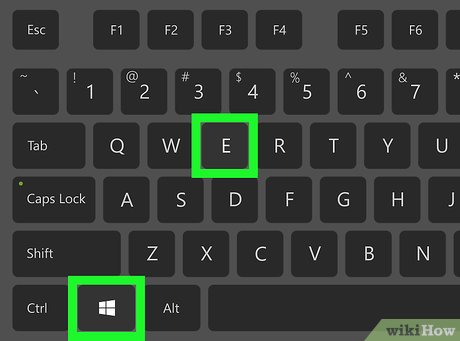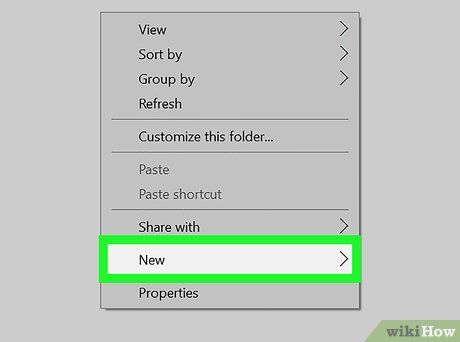How to Lock a Folder on Windows
Part 1 of 4:
Creating a Lock File
-
 Press ⊞ Win+E. This opens the File Explorer.
Press ⊞ Win+E. This opens the File Explorer. -
 Double-click the folder you want to lock. This opens the contents of the folder.
Double-click the folder you want to lock. This opens the contents of the folder. -
 Right-click an empty part of the folder. A menu will appear.
Right-click an empty part of the folder. A menu will appear. -
 Click New. A list of file types will appear.
Click New. A list of file types will appear. -
 Click Text Document.
Click Text Document. -
 Type lock and press ↵ Enter. You now have a text file called 'lock' in the current folder.
Type lock and press ↵ Enter. You now have a text file called 'lock' in the current folder. -
 Double-click the 'lock' file. This opens the blank file in your default text editor (e.g. Notepad). You'll need to paste some code into this file.
Double-click the 'lock' file. This opens the blank file in your default text editor (e.g. Notepad). You'll need to paste some code into this file.
Part 2 of 4:
Adding the Lock Code
-
 Open a web browser. You can use any web browser on your computer, such as Edge, Chrome, or Firefox.
Open a web browser. You can use any web browser on your computer, such as Edge, Chrome, or Firefox. -
 Navigate to https://www.laptopmag.com/articles/password-protect-folder-windows-10. This is the site from which you can copy the code.[1]
Navigate to https://www.laptopmag.com/articles/password-protect-folder-windows-10. This is the site from which you can copy the code.[1] -
 Scroll down to the code that begins with 'cls @ECHO OFF.' The code begins right after the 6th step in the article.
Scroll down to the code that begins with 'cls @ECHO OFF.' The code begins right after the 6th step in the article. -
 Copy all of the code. To do this, click the mouse before 'cls' and then drag it all the way to the end of the code, then press Ctrl+C.
Copy all of the code. To do this, click the mouse before 'cls' and then drag it all the way to the end of the code, then press Ctrl+C. -
 Return to the 'lock' file that's open in your text editor. The file should be blank.
Return to the 'lock' file that's open in your text editor. The file should be blank. -
 Click the mouse cursor in the file and press Ctrl+V. The copied code will appear in the file.
Click the mouse cursor in the file and press Ctrl+V. The copied code will appear in the file. -
 Locate and highlight Your-Password-Here. If you're having a hard time finding it, press Ctrl+F to open the Search tool, type your-password-here into the box, then press ↵ Enter. The text should automatically highlight.
Locate and highlight Your-Password-Here. If you're having a hard time finding it, press Ctrl+F to open the Search tool, type your-password-here into the box, then press ↵ Enter. The text should automatically highlight. -
 Type a lock password. Since Your-Password-Here is highlighted, it will disappear once you start typing your lock password. The password you type is the one you'll need to enter to access the folder.
Type a lock password. Since Your-Password-Here is highlighted, it will disappear once you start typing your lock password. The password you type is the one you'll need to enter to access the folder. -
 Click the File menu. It's at the top of the window.
Click the File menu. It's at the top of the window. -
 Click Save As….
Click Save As…. -
 Select All Files from the 'Save As type' drop-down menu. It's the first drop-down menu at the bottom of the window.
Select All Files from the 'Save As type' drop-down menu. It's the first drop-down menu at the bottom of the window. -
 Change the file name to FolderLocker.bat. To do this, erase what's already in the 'File name' field and type FolderLocker.bat.
Change the file name to FolderLocker.bat. To do this, erase what's already in the 'File name' field and type FolderLocker.bat. -
 Click Save. Now you're ready to password-protect your files.
Click Save. Now you're ready to password-protect your files.
Part 3 of 4:
Locking the Folder
-
 Double-click FolderLocker in the File Explorer window. This creates a new folder called Locker in the current folder.[2]
Double-click FolderLocker in the File Explorer window. This creates a new folder called Locker in the current folder.[2] -
 Drag the files you want to lock to the Locker folder. Dragging files to this locker will also remove them from their current folder.
Drag the files you want to lock to the Locker folder. Dragging files to this locker will also remove them from their current folder. -
 Double-click FolderLocker. This opens a black window that asks, 'Are you sure u want to lock the folder (Y/N).'
Double-click FolderLocker. This opens a black window that asks, 'Are you sure u want to lock the folder (Y/N).' -
 Press Y.
Press Y. -
 Press ↵ Enter. The window will disappear, as will the folder called Locker. Don't worry, it's still there—you'll just have to run the FolderLocker script to make it visible.
Press ↵ Enter. The window will disappear, as will the folder called Locker. Don't worry, it's still there—you'll just have to run the FolderLocker script to make it visible.
Part 4 of 4:
Accessing Files in the Locked Folder
-
 Double-click the folder where you created the Locker. You can do this from the File Explorer at any time.
Double-click the folder where you created the Locker. You can do this from the File Explorer at any time.- This is the folder that contains the file called FolderLocker.
-
 Double-click FolderLocker. A black window will appear, asking you to enter the password.
Double-click FolderLocker. A black window will appear, asking you to enter the password. -
 Type the Locker password and press ↵ Enter. This brings back the Locker folder, which is now accessible.
Type the Locker password and press ↵ Enter. This brings back the Locker folder, which is now accessible.
Share by
Marvin Fry
Update 04 March 2020



























